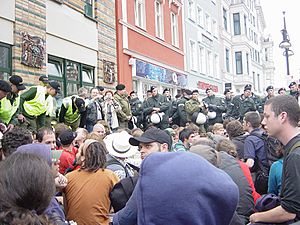Sit-in facts for kids
A sit-in is a type of peaceful protest where people sit down in a public or private place and refuse to leave. It's a way to show disagreement or demand change without using violence. People who do sit-ins hope to draw attention to an issue and encourage others to support their cause.
Contents
What is a Sit-in Protest?
A sit-in is a form of "direct action." This means it's a way for people to directly challenge something they believe is unfair or wrong. Instead of just holding signs or marching, they physically occupy a space. By staying put, they disrupt normal activities and make it hard for others to ignore their message. It's a powerful way to use nonviolent resistance.
Why Do People Do Sit-ins?
People choose sit-ins for many reasons. They might be protesting against unfair laws, discrimination, or policies they disagree with. The goal is often to create a situation where authorities or businesses have to listen to their demands. Sit-ins can bring a lot of media attention to an issue, helping more people learn about it and join the cause. They are a way for ordinary people to make their voices heard.
Famous Sit-ins in History
Sit-ins have been used throughout history to fight for many different rights and changes. They became very important during the Civil Rights Movement in the United States.
The Greensboro Sit-ins
One of the most famous examples happened in Greensboro, North Carolina, in 1960. Four African American college students sat down at a "whites-only" lunch counter at a Woolworth's store. They were refused service but stayed in their seats peacefully. This act of courage inspired many other students to do the same across the country. These sit-ins helped to end segregation in many public places.
How Sit-ins Work
Sit-ins are usually planned carefully. People decide on a location that is important to their protest, like a government building, a business, or a public space. They gather, sit down, and refuse to move, even if asked to leave. The idea is to remain peaceful and nonviolent, no matter what.
Rules for a Sit-in
For a sit-in to be effective and safe, protesters often follow certain rules:
- They remain calm and do not react to insults or threats.
- They do not use violence or destroy property.
- They are prepared to stay for a long time, sometimes even overnight.
- They understand the risks involved, but prioritize their message.
Sit-ins show the power of peaceful protest. They prove that people can make a big difference by standing (or sitting) together for what they believe is right.
Images for kids
-
Benjamin Cowins during a 1961 sit-in at McCrory's lunch counter in Tallahassee
-
Human rights sit-in at the Taiwanese executive assembly
-
A dharna in Virar, Maharashtra
See also
 In Spanish: Sentada para niños
In Spanish: Sentada para niños
 | Selma Burke |
 | Pauline Powell Burns |
 | Frederick J. Brown |
 | Robert Blackburn |







